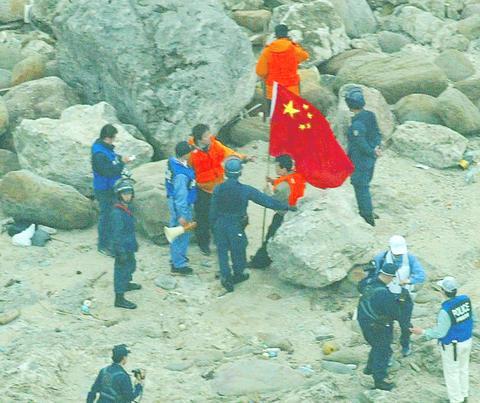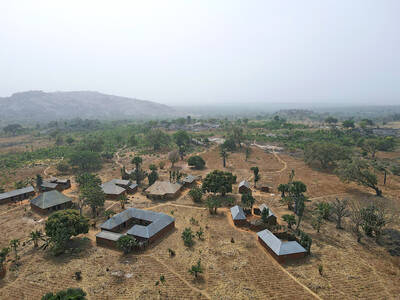Japan, seeking to minimize damage to ties with Beijing, will send seven Chinese activists arrested after landing on a small disputed island back to China after questioning them, a Foreign Ministry spokesman said yesterday.
The seven, all men, evaded Japanese Coast Guard vessels to land on the rocky island in the East China Sea on Wednesday, prompting Japan to protest to China through its ambassador in Tokyo and to send 18 police by helicopter to remove them.
In Beijing, about two dozen protesters burned Japanese flags outside Tokyo's embassy in a protest against the arrests.

PHOTO: AP
"The Chinese people cannot be insulted," they chanted.
China, Taiwan and Japan all claim sovereignty over the uninhabited island cluster, which provides access to rich fishing grounds and possible oil deposits in the area.
Beijing calls the islands the Diaoyus and Japan refers to them as the Senkakus.
Japanese Foreign Ministry spokesman Hatsuhisa Takashima said the seven would be questioned by police on the southern island of Okinawa before being sent back to China.
"We do not want to play up this incident as an obstacle to the promotion of better relations between China and Japan," Takashima said of the latest row over the islands, which lie between Okinawa and Taiwan.
China has demanded that Japan ensure the safety of the group and has reiterated its claim to the islands.
The seven Chinese were brought to Naha, the capital of Okinawa, early yesterday for questioning by police.
Chief Cabinet Secretary Yasuo Fukuda expressed hope that the incident would not affect relations between Tokyo and Beijing.
"I hope that this issue will not adversely affect the entire Sino-Japanese relations," Fukuda told reporters.
"But it is crystal clear that the Senkaku islands are our country's indigenous territory."
Ties between the two Asian neighbors have already been strained by Japanese Prime Minister Junichiro Koizumi's annual visits to Tokyo's Yasukuni Shrine for war dead, where convicted war criminals are among those honored.
Fukuda said Japan would handle the issue "solemnly" based on domestic and international laws.
"We are investigating whether there is any political intention [behind their landing on the island]," he said.
The Japanese government is trying to dissuade a right-wing Japanese group from making a trip to the island, Takashima said.
"We are aware of it [the planned trip] but we are telling them not to do it," he said.
Japan has formally claimed sovereignty over the islands since 1895 and says Beijing did not stake its claim until the 1970s, when talk emerged of oil resources in the area.
China and Taiwan say their claims go back to ancient times.
Japanese Foreign Minister Yoriko Kawaguchi, who is due to visit China on April 3 to discuss a range of issues, may raise the islands spat during her talks in Beijing.
"The Senkakus is one of the main bilateral issues between the two countries so she might raise the issue to seek China's cooperation to prevent this kind of thing," Takashima said.

‘TERRORIST ATTACK’: The convoy of Brigadier General Hamdi Shukri resulted in the ‘martyrdom of five of our armed forces,’ the Presidential Leadership Council said A blast targeting the convoy of a Saudi Arabian-backed armed group killed five in Yemen’s southern city of Aden and injured the commander of the government-allied unit, officials said on Wednesday. “The treacherous terrorist attack targeting the convoy of Brigadier General Hamdi Shukri, commander of the Second Giants Brigade, resulted in the martyrdom of five of our armed forces heroes and the injury of three others,” Yemen’s Saudi Arabia-backed Presidential Leadership Council said in a statement published by Yemeni news agency Saba. A security source told reporters that a car bomb on the side of the road in the Ja’awla area in

‘SHOCK TACTIC’: The dismissal of Yang mirrors past cases such as Jang Song-thaek, Kim’s uncle, who was executed after being accused of plotting to overthrow his nephew North Korean leader Kim Jong-un has fired his vice premier, compared him to a goat and railed against “incompetent” officials, state media reported yesterday, in a rare and very public broadside against apparatchiks at the opening of a critical factory. Vice Premier Yang Sung-ho was sacked “on the spot,” the state-run Korean Central News Agency said, in a speech in which Kim attacked “irresponsible, rude and incompetent leading officials.” “Please, comrade vice premier, resign by yourself when you can do it on your own before it is too late,” Kim reportedly said. “He is ineligible for an important duty. Put simply, it was

Syrian President Ahmed al-Sharaa on Sunday announced a deal with the chief of Kurdish-led forces that includes a ceasefire, after government troops advanced across Kurdish-held areas of the country’s north and east. Syrian Kurdish leader Mazloum Abdi said he had agreed to the deal to avoid a broader war. He made the decision after deadly clashes in the Syrian city of Raqa on Sunday between Kurdish-led forces and local fighters loyal to Damascus, and fighting this month between the Kurds and government forces. The agreement would also see the Kurdish administration and forces integrate into the state after months of stalled negotiations on

CHURCH ABDUCTIONS: Remarks by police and other officials were ‘intended to prevent unnecessary panic while facts were being confirmed,’ a spokesman said Nigerian police on Tuesday made an about-turn, saying that gunmen had abducted dozens of people during Sunday mass in northern Kaduna State after dismissing the initial reports. A senior Christian clergy and a village head had on Monday told reporters that more than 160 people were snatched from several churches on Sunday. A security report prepared for the UN said that more than 100 people had been kidnapped at multiple churches. The chief of police of Kaduna State and two senior government officials had initially issued denials, saying security officers had visited the scene of the alleged crimes and found no proof of